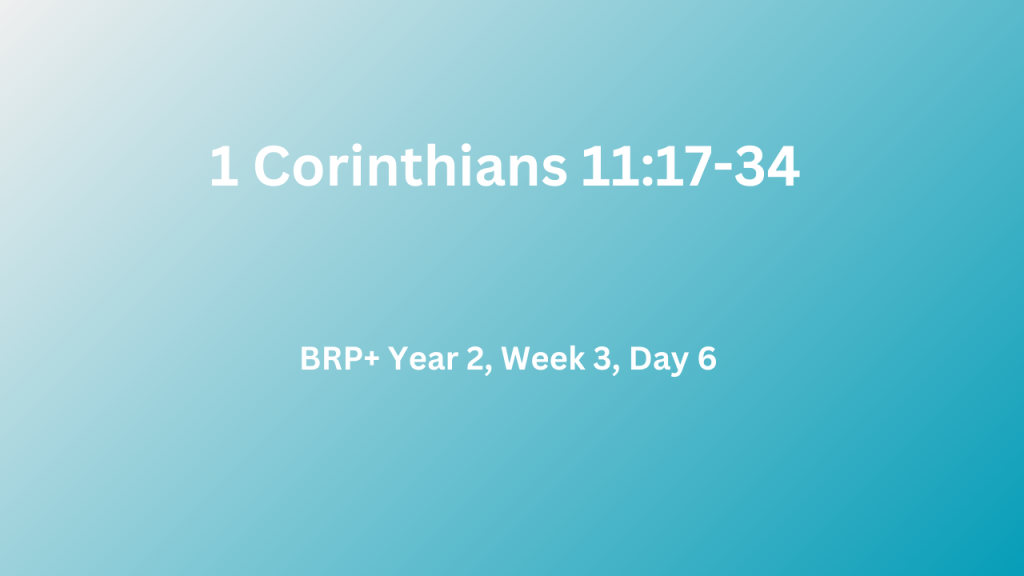1 Corinthians 11:17-34
Q.1. What church practice was Paul addressing? Why did Paul suggest such schisms exist? What was wrong with their participation in ‘love-feasts’? How should they respond? – (1 Cor.11:17-22)
Before giving his revelation about the Lord’s Supper, Paul expressed his concerns about the way the church shared in their ‘love-feasts’. The ‘love-feast’ was an extended time of fellowship amongst the members, involving eating a meal together, of which the Lord’s Supper was often a part. Paul was disgusted by the report – that divisions exist among you (1 Cor.11:18 c.f. 1 Cor.11:22). This was demonstrated with shocking factionalism and discrimination – for in your eating each one takes his own supper first; and one is hungry, and another is drunk (1 Cor.11:21). This was the exact opposite meaning and purpose for the ordinance of the Lord’s Supper. Their behaviour identified those who were divisive, and also those who were approved, whose example should be followed (1 Cor.11:19). Paul advised those who abused the unity of the body, to stay home to eat and drink their meals (1 Cor.11:22).
Q.2. What had Paul taught them about the Lord’s Supper? What are the emblems supposed to convey? How often and how long should we partake of the Lord’s Supper? – (1 Cor.11:23-26)
Paul had previously – delivered to the Corinthians … what he had received from the Lord regarding the Lord’s Supper (1 Cor. 11:23). On the night He was betrayed, He took bread – and when He had given thanks, He broke it and said, “This is My body, which is for you; do this in remembrance of Me.” In the same way He took the cup also after supper, saying, “This cup is the new covenant in My blood; do this, as often as you drink it, in remembrance of Me.” (1 Cor.11:24-25). The Lord’s Supper is a memorial feast, in which the emblems are partaken– “in remembrance of Me”. The Last Supper was actually a modified Jewish Passover feast. It was instituted by Jesus, before His atoning sacrifice for sinners on the cross (c.f. Exo.12:21-27; Mt.26:17-19; Mk.14:12-16; Lk.22:7-20). At the Last Supper, Jesus gave the emblems of the bread and the cup a new meaning. He declared that they represented His broken body and His shed blood. Paul asserted that – as often as you eat this bread and drink the cup, you proclaim the Lord’s death until He comes (1 Cor.11:26). We are not to neglect to commemorate the Lord’s Supper. It is a clear Gospel presentation. We are to observe the feast – until Christ comes. The frequency is – whenever. Jesus gave us the Lord’s Supper, so that His church would never forget the basis of their righteous standing before God.
Q.3. What clue do we have to help us understand what it means to partake in an unworthy manner? How can we avoid this sin? What may God do about unworthy conduct? – (1 Cor.11:27-34)
The Corinthians had continued the practice of partaking of the love feasts and the Lord’s Supper. The context suggests that the divisions and favouritism that had crept into their fellowship, belied the whole nature and purpose of Christ’s death. Paul warned that – whoever eats the bread or drinks the cup of the Lord in an unworthy manner shall be guilty of the body and the blood of the Lord (1 Cor.11:27). It is a serious sin against Christ, to accept His redemption, and then to refuse reconciliation with other believers. Paul commanded that, to avoid being guilty of insulting Jesus in this way, – a man must examine himself, and in so doing he is to eat of the bread and drink of the cup (1 Cor.11:28). To fail to do this before partaking is dangerous, because – For he who eats and drinks, eats and drinks judgment to himself if he does not judge the body rightly (1 Cor.11:29). Paul claimed that judgment had fallen on the Corinthian church, and some had had their lives cut short (1 Cor.11:30 c.f. Jn.11:11-14; Acts 5:1-11). If we partake in an unworthy manner, we attract God’s displeasure and discipline (1 Cor.11:31-32). We should take all steps necessary to avoid excesses, and we should strive to be united (1 Cor.11:33-34).

